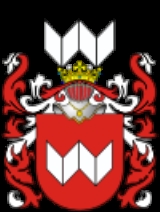
Jerzy Jazlowiecki
Encyclopedia
| Jerzy Jazłowiecki | |
| EWLINE |
|
| Noble Family Szlachta The szlachta was a legally privileged noble class with origins in the Kingdom of Poland. It gained considerable institutional privileges during the 1333-1370 reign of Casimir the Great. In 1413, following a series of tentative personal unions between the Grand Duchy of Lithuania and the Kingdom of... |
Jazłowiecki |
| Coat of Arms Polish heraldry Polish heraldry is a branch of heraldry focused on studying the development of coats of arms in the lands of historical Poland , as well as specifically-Polish traits of heraldry. The term is also used to refer to Polish heraldic system, as opposed to systems used elsewhere, notably in Western Europe... |
Abdank |
| Parents | Mikołaj Jazłowiecki Ewa Podfilipski |
| Consorts | |
| Children | Mikołaj Jazłowiecki Hieronim Jazłowiecki Michał Jazłowiecki Druzjanna Jazlowiecki |
| Date of Birth | 1510 |
| Place of Birth | ? |
| Date of Death | 1575 |
| Place of Death | ? |
Jerzy Jazłowiecki (1510–1575) was a Polish
Poland
Poland , officially the Republic of Poland , is a country in Central Europe bordered by Germany to the west; the Czech Republic and Slovakia to the south; Ukraine, Belarus and Lithuania to the east; and the Baltic Sea and Kaliningrad Oblast, a Russian exclave, to the north...
magnate
Magnate
Magnate, from the Late Latin magnas, a great man, itself from Latin magnus 'great', designates a noble or other man in a high social position, by birth, wealth or other qualities...
and nobleman (szlachcic). Great Crown Hetman 1569–1575, Field Crown Hetman in 1569. Jerzy was voivode of the Podole Voivodship since 1567, of the Ruthenian Voivodship since 1569, and castellan
Castellan
A castellan was the governor or captain of a castle. The word stems from the Latin Castellanus, derived from castellum "castle". Also known as a constable.-Duties:...
of Kamieniec Podolski since 1564 as well.
In 1564 as royal emissary he was sent to sultan
Sultan
Sultan is a title with several historical meanings. Originally, it was an Arabic language abstract noun meaning "strength", "authority", "rulership", and "dictatorship", derived from the masdar سلطة , meaning "authority" or "power". Later, it came to be used as the title of certain rulers who...
Suleiman the Magnificent
Suleiman the Magnificent
Suleiman I was the tenth and longest-reigning Sultan of the Ottoman Empire, from 1520 to his death in 1566. He is known in the West as Suleiman the Magnificent and in the East, as "The Lawgiver" , for his complete reconstruction of the Ottoman legal system...
. During the interregnum
Interregnum
An interregnum is a period of discontinuity or "gap" in a government, organization, or social order...
in 1573 he was a proposed candidate of the so-called "Piast party" in the election for the Polish throne. In the late 1550s. he converted to Calvinism
Calvinism
Calvinism is a Protestant theological system and an approach to the Christian life...
and became an ardent supporter of the Polish Reformed Church
Polish Reformed Church
The Polish Reformed Church, officially called the Evangelical Reformed Church in the republic of Poland is a historic Protestant church in Poland established in the 16th century, still in existence today.-Structure and organisation:An internal census showed that in 2004 the Polish Reformed Church...
.


